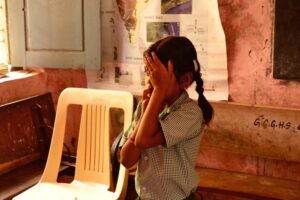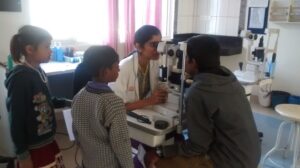Understanding the Problem
 Vision is the primary data-gathering system of humans, providing invaluable sensory information and integrating this information holistically to help us make sense of the world. All other senses put together cannot provide equal info to the brain. The eye is a very sensitive organ. Hence in the field of eye-care, an early diagnosis can make a significant difference to the prospects of correction and cure.
Vision is the primary data-gathering system of humans, providing invaluable sensory information and integrating this information holistically to help us make sense of the world. All other senses put together cannot provide equal info to the brain. The eye is a very sensitive organ. Hence in the field of eye-care, an early diagnosis can make a significant difference to the prospects of correction and cure.
In children, every year of non-diagnosis of ophthalmic issues can lead to irreparable vision loss. Students who come from modest backgrounds have no access to reliable preventive or curative healthcare. In the absence of screening, children are brought for medical attention only after significant damage has happened.
Reaching children in remote rural locations and providing them access to medical care is a significant logistical challenge for eye-care providers
No child should needlessly suffer from vision loss or blindness for the absence of access to eye-care.
Nannu Kannu is a flagship program of Sankara Eye Hospital to provide quality eye-care for children. The unique role played by us, is to design a program that will take the benefits of the program to the most remote areas through volunteer-led initiatives.
The Aim
The program is a very robust preventive eye-care initiative for rural children.
One Good Step, partnered with Sankara Eye Foundation, who are pioneers in the area of community based eye-care for this program.
The initial aim was to screen 10000 school going children for potential eye defects. About 5-10% this population has been observed to have eye issues.
Majority of these errors are refractive errors and can be corrected with glasses. A miniscule number of students will have more serious ailments.
The Solution
 Having garnered the support of corporate volunteer groups we designed a training that doctors from Sankara Hospital imparted to these volunteers for primary eye screening.
Having garnered the support of corporate volunteer groups we designed a training that doctors from Sankara Hospital imparted to these volunteers for primary eye screening.
The effort then involved close co-ordination with the government education department to map out schools, routes, transport logistics and volunteer deployment.
The trained volunteers then performed the primary screening at the schools. Working in pairs, the trained volunteers did a phenomenal job of thorough evaluation.
For students who were short-listed the secondary screening was performed by medical professionals from Sankara on-site.
Children with refractive errors were prescribed glasses which were made and sent back to the schools for distribution.
Students who needed other medical interventions were brought back to the hospital for free treatment (both medical and surgical)
The uniqueness of the model
- Volunteers (teachers/corporate professionals) learn the skills needed for primary screening. Volunteer support will be the basis on which we can cover a large number of students.
- For refractive errors the students don’t even need to go to a hospital. It will be corrected on-site.
- The following year the teachers in these schools can perform the screening themselves thus increasing student coverage.
Children screened and 1700+ treated
Nannu Kannu has thus been one of our most successful programs bringing together diverse stakeholders to provide a service to our children that has a significant impact on their lives.
